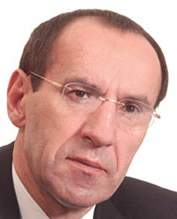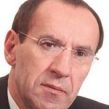
KREMLIN APPOINTS NEW GOVERNMENT IN KARACHAEVO-CHERKESSIA
Publication: Eurasia Daily Monitor Volume: 2 Issue: 33
By:

On February 3, a new government was announced in the republic of Karachaevo- Cherkessia. Following months of unrest, Moscow sought to stabilize the situation. With the republic’s president rapidly losing his credibility, the Kremlin has turned to familiar faces to lead the republic.
Last October, Karachaevo-Cherkessia, usually the most stable of the North Caucasian republics, suddenly exploded. Seven businessmen, shareholders of the republic’s two largest factories, were murdered. Ali Kaitov, the son-in-law of President Mustafa Batdyev, was implicated in the crime, and an angry crowd stormed the presidential office in Cherkessk, the regional capital. Batdyev escaped through a back door, triggering the collapse of the local ruling system. Dmitry Kozak, Russian President Vladimir Putin’s envoy to the Southern Federal District, rushed to the republic and managed to persuade the enraged relatives of the murdered shareholders to vacate Batdyev’s inner office.
This incident was only the beginning, however, and Kozak had to rebuild the local system of governance. The relatives, members of several influential Karachai clans, continued to demand Batdyev’s resignation, and their cause was supported by allies of Vladimir Semenov, who himself had been president of the republic from 1999 to 2003.
The first step to resolve the crisis was the removal of local security officials. On November 25, 2004, the local prosecutor and the regional minister of internal affairs resigned (regnum.ru, November 25, 2004). Kaitov, several of his guards, and a police officer who had helped him block the murder investigation were all arrested. They are still in jail awaiting trial.
At the same time, the Kremlin could not allow Batdyev to appear to resign under popular pressure, as it would set a dangerous precedent for other republics. Thus Nikolai Shepel, a regional deputy prosecutor general, told Izvestiya that an interrogation of Batdyev had not revealed any reason to prosecute him (Izvestiya, January 27).
In another sign that his independence is waning, Batdyev has been selling his assets. On December 28, 2004, Regnum News Agency reported that shares in Kaitov’s Kavkaztsement factory had been transferred to Eurotsement, a holding company owned by the Moscow city government (regnum.ru, December 28, 2004). Almost simultaneously, 62% of the shares of the Cherkessk Chemical Factory were sold to Ak Bars, a bank in Tatarstan (regnum.ru, December 28, 2004). These two factories were the source of the dispute between Ali Kaitov and the murdered businessmen. According to Fatima Tlisova, a journalist from Novaya gazeta, 60% of the Kavkaztsement shares belonged directly to President Batdyev. He sold them for $40 million (Radio Liberty, January 21). These moves suggest that not only is Moscow aiming to curb Batdyev’s political power, but also his economic influence in the republic.
As a result of these maneuverings, Stanislav Derev, the former mayor of Cherkessk who lost the presidential race to Batdyev in 2003, became the sole shareholder of at least one of the factories. Derev reported that he had bought 62% of the shares of Cherkessk Chemical from Ak Bars Bank, and Batdyev had directly sold him another 32% for $5 million. Derev, who also owns the Merkury mineral water company, immediately announced that the chemical factory was in bad shape but that he would make it profitable very quickly (Radio Liberty, January 20).
Batdyev’s political influence has followed the same downward path as his economic fortune. On February 3, he had to fire presidential administration chief Murat Karaketov, who the opposition particularly disliked. Karaketov was replaced by Valentin Lesnichenko, a Russian who had been First Secretary of the Karachaevo-Cherkessia Committee of the Communist Party in Soviet times (yufo.ru, February 3). There is no doubt that Lesnichenko is the Kremlin’s man, not Batdyev’s choice.
Lesnichenko will run the republic and deal with members of the newly appointed government. Half of the new government, including the new prime minister, served under Semenov, and rumors suggest that Semenov supporters may have been behind the anti-Batdyev demonstrations last October (regnum.ru, February 3). In addition, the house cleaning removed Mikhail Yakush, the mayor of Cherkessk, and Islam Burlakhov, the chairman of the republic Supreme Court; both men are long-time Derev allies. The mayor of Karachaevsk, Saparbi Laipanov, is one of Semenov supporters (regnum.ru, February 3).
Batdyev’s weakening position became so clear that rumors started to circulate in the republic that the he was going to leave his post to go to Moscow, where a place in the Central Bank management had been reserved for him (Nezavisimaya gazeta, January 21). The president rejected all such insinuations, saying that he was not going to resign and that it was his own decision to change the government in order to make it more “independent” of him.
Stanislav Derev is quickly strengthening his position at the expense of Batdyev. While part of the new government consists of Semenov’s men, another segment includes representatives of various Cherkess clans led informally by Derev. On February 10, Kozak appointed Derev to be his adviser, along with Ramzan Kadyrov of Chechnya. It is becoming more and more obvious that Derev is a contender to replace Batdyev. According to the new federal law, Putin will name Batdyev’s successor.
Clearly, the federal government is implementing its new strategy in Karachaevo-Cherkessia. Alexei Malashenko, a professor at the Moscow State Institute of International Relations, said that Kozak had highlighted the need to break the longtime habit of dividing people into two camps — those close to the authorities and everyone else — and pointed out that conflicts broke out in the North Caucasus “when regional authorities subject people to inequality.”
The Kremlin seems to have realized that its policy to put all its bets on one clan in ethnic republics does not work. Whatever the new strategy, be it promoting one clan or several, any Kremlin-made political structure will still look like a pyramid, and the one man at the top will be appointed by and totally dependent on Moscow.




